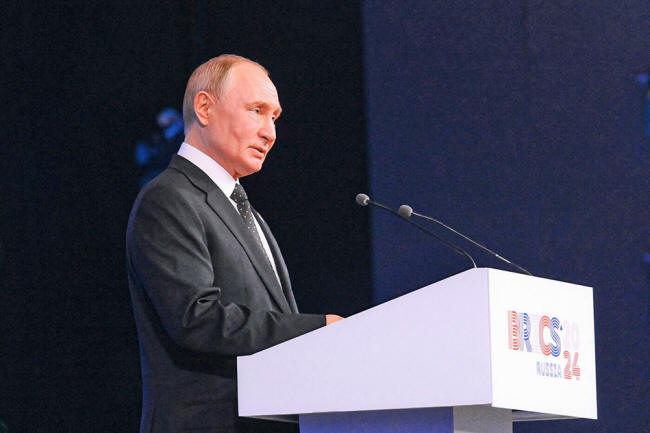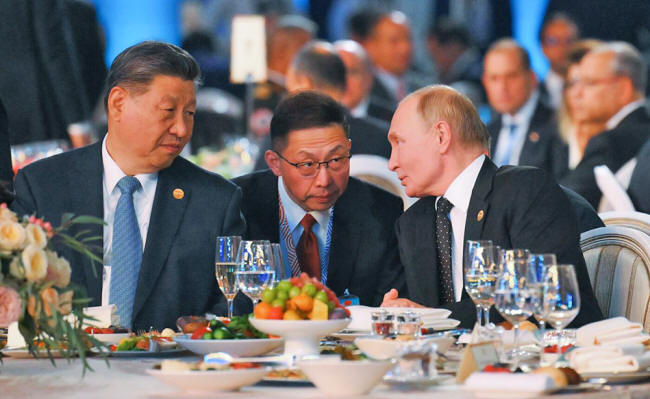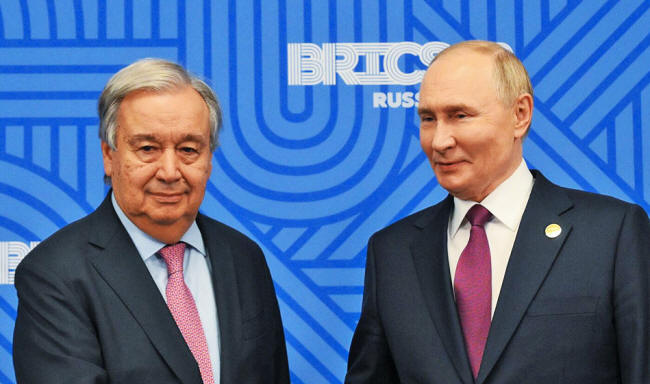|

by Peter Koenig
October 28, 2024
from
GlobalResearch Website
|
Peter Koenig
is a geopolitical
analyst and a former Senior Economist at the World Bank
and the World Health Organization (WHO), where he worked
for over 30 years around the world.
He is the author of
"Implosion - An Economic Thriller about War,
Environmental Destruction and Corporate Greed" and
co-author of Cynthia McKinney's book "When China Sneezes
- From the Coronavirus Lockdown to the Global
Politico-Economic Crisis"
(Clarity Press -
November 1, 2020). |

BRICS 16th
Summit
-
2024 -
Was the summit successful?
Depending on what one looks at and what is considered a success.
At the outset, it was a success, if only because it put issues and
differences openly on the table to be disputed and eventually
resolved.
The meeting itself did not produce much novelties.
For example,
many remarkable happenings, dispute
resolutions and agreements happened at the margin of the summit
or before.
Most notably, what did not happen was another
expansion of the
BRICS alliance.
Since the 2023 BRICS summit in Johannesburg,
when,
Egypt, Ethiopia, Iran, and the United Arab
Emirates (UAE) joined the five original members, Brazil,
Russia, India, China, and South Africa, no new members have
joined.
However, two more nations that were invited in
Johannesburg in 2023 to become members - Argentina and Saudi Arabia
- have either declined (Argentina),
or, so far, not acted on becoming a member (Saudi Arabia).
In fact, Saudi's acting ruler, crown prince
Mohammad bin Salman, was among the notable absentees in Kazan.
Could it be western "pressure"... by Saudi's western hydrocarbon
clients and military supporters?
BRICS internal rifts or disagreements concern
accession conditions for new members.
Missing is also a common set of internal
rules that would lend the alliance stability and credibility
vis-à-vis the outside world.
The BRICS also lack a common Secretariat and common
guiding principles on policies of trade, economic and military
cooperation.
For a new member to be accepted, it needs the
unanimous support of the existing members - currently nine.
For example,
Venezuela is an eager candidate to join the
Club, but was vetoed by Brazil, for reasons that have more to do
with the two countries' bilateral relationship than with the
enlargement of BRICS.
Such bilateral conflicts do not help the group's
coherence and credibility, the so far most important Global South
organization.
Already in September 2024, Turkey had expressed her interest in
joining the BRICS and did, indeed, apply for membership.
Turkey would be the first
NATO member to join the BRICS;
yet, so far, her accession has been stalled.
Although,
Mark Rutte, the new NATO chief,
when recently questioned, did not object at all, saying that Turkey
was a sovereign country and could join the BRICS alliance on her own
free will.
He added that Turkey would nevertheless remain
one of the most important NATO members.
Perhaps Turkey's NATO membership was a thorn
in the eyes of some Global South states...
However, India, not a de jure NATO member,
has close relations with NATO and the US.
Yet, India is a founding member of the BRICS...
Perhaps the perceptions have changed since the
2006 formation of the alliance.

President of Russia Vladimir
Putin, right,
and President
of the People's Republic of China Xi Jinping, left,
during the
official reception of the 16th BRICS Summit.
(Alexey
Nikolskiy / Photohost agency brics-russia2024.ru)
Mr. Putin said that there are some 30 countries that wanted to join
the BRICS, among them most notably,
-
Azerbaijan
-
Algeria
-
Vietnam
-
Indonesia
-
Pakistan
-
Malaysia
-
Nigeria
-
Thailand
-
Venezuela
-
Palestine
-
DR Congo
-
Gabon
-
Bangladesh
-
Bahrain
-
Kuwait
-
Senegal
-
Bolivia
On the other hand, Kazakhstan,
Russia's largest neighbor in Central Asia, was invited by Russia to
join the BRICS, but in a last-minute decision opted not to join.
Russia was not only surprised, but not
pleased at all for this abrupt decision, and promptly banned
imports of a range of agricultural products from Kazakhstan in
retaliation.
According to the Oil & Gas Journal (OGJ), Kazakhstan has
proven crude oil reserves of 30 billion barrels, 2nd
largest endowment in Eurasia after Russia, and the 12th
largest in the world, just behind the United States.
With 172 oil fields, Kazakhstan possesses 3%
of global oil reserves, putting it among the world's top dozen
countries in terms of oil deposits.
Could it be that Kazakhstan reacted to some
"pressure," possibly blackmail, from western oil
customers...?
Perhaps one of the most important conflict resolutions at the
margins of the meeting happened during a face-to-face dialogue
between PM Narendra Modi of India and China's President Xi
Jinping, the first in five years.
Just a few months ago, tensions between New Delhi and Beijing were
intense enough for Mr. Modi to decline participation in the summit
of the Shanghai Cooperation Organization (SCO) in Astana,
Kazakhstan.
Yet, the two countries have now reached a deal
over their longstanding border dispute.
The two most populous and, in terms of GDP, economically most
powerful members of the BRICS coalition have not only an opportunity
to rebuild their relations, but also to create a building block to
help overcome BRICS disagreements.
If one mentions BRICS internal disagreements, it may be
important to notice that external, meaning western
interference in terms of threats and coercions to say the
least, may have played an important role in the organization's
disarray that prevented - for now - a further expansion.
Improved relations between China and India could generate a momentum
for BRICS to deliver on its ambitious agenda to develop, and
ultimately implement, a vision for a new multi-polar global order.
It would lead into the direction of what Mr. Putin said in
his opening address during the BRICS summit, that the BRICS alliance
was not anti-west but merely,
a movement for independence, or potentially a
shift from an anti-western to a non-western agenda.
Strangely but also remarkably, one of the west's
most feared "threats" of the BRICS summit was the summit's talk and
potentially resolution on the alliance's
dedollarization.
It appears that none of that has happened...
Many of the BRICS countries are not
interested in dedollarizing their economies, such as
Brazil, India, the Emirates, and others.
Let alone potential candidates like Saudi
Arabia, Turkey, and Venezuela.
Instead, Mr. Putin put forward the idea of a new
BRICS lending platform for a collective, coercion-free economic
advancement and investment agenda, for infrastructure, industrial as
well as social services development.
Mr. Putin noted that
the IMF and the World Bank, the
Bretton Woods Institutions created at the end of WWII, were heavily
influenced by the west, especially the United States.
He did mention the BRICS bank, but not necessarily as a
lending platform, as it is also fully dollarized, hence, not free
from western coercive interferences.
However, China's creation, the Asian Infrastructure and
Investment Bank (AIIB),
already involved with some of the BRICS, could become a more
important development investment instrument in the future.

President of Russia Vladimir
Putin, right,
and UN
Secretary-General Antonio Güterres
during their
meeting on the sidelines
of the 16th
BRICS Summit in Kazan, Russia.
By Ekaterina
Chesnokova
Photohost
agency brics-russia2024.ru
In an open conversation with Mr. Antonio Güterres, UN
Secretary General who also attended the Kazan summit, Mr. Putin
mentioned that it was time for
the UN to,
"adapt to the realities of the 21st
century" to be effective.
This meant foremost reconfiguring the Security
Council to give the emerging Global South, for which BRICS might
be representative, a more prominent role.
Citing the UN Chief, saying,
"You've mentioned we all should represent one
big family",
...the Russian president responded,
"and that is how we live. Families,
unfortunately, have disagreements, scandals, division of
property. They even fight at times."
Mr. Putin is right...
Implicit in this statement is often outside,
speak,
western, meddling to foster disagreements and
rifts within groups of countries, who want to go their own way,
like the BRICS.
The Kazan summit may have been a
precursor for things to come...!
But western interference will not be able to stop
the BRICS alliance and cooperation towards a new
multi-polar world order.
|




